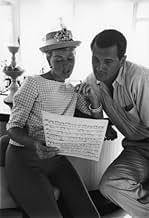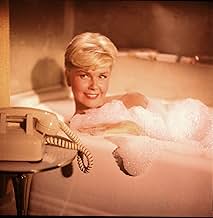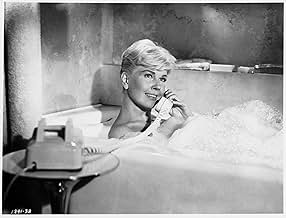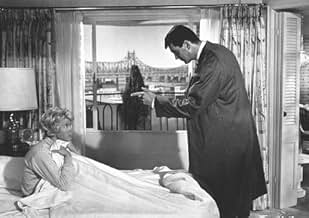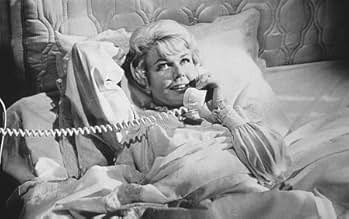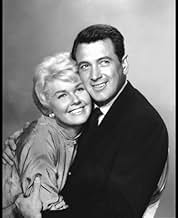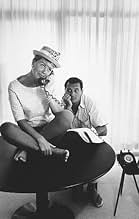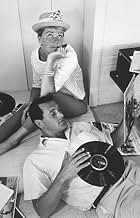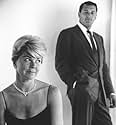CALIFICACIÓN DE IMDb
7.4/10
20 k
TU CALIFICACIÓN
Una comedia trágica de enredos románticos alrededor de una línea de teléfono compartida.Una comedia trágica de enredos románticos alrededor de una línea de teléfono compartida.Una comedia trágica de enredos románticos alrededor de una línea de teléfono compartida.
- Dirección
- Guionistas
- Elenco
- Ganó 1 premio Óscar
- 8 premios ganados y 11 nominaciones en total
Opiniones destacadas
How can you critique something you are just meant to enjoy? There will never be another combination like Doris and Rock, both giving everything to their roles. And you can tell they are having fun doing them. I especially enjoyed Rock's bit of physical comedy trying to squeeze himself into a very low sports car!
By 1958, Doris Day's career was on the downslide and something drastic needed to be done to revive her career. 1959'S PILLOW TALK redefined Doris' image and created an entirely new genre of the "will she or won't she" sex comedy as well as introducing one of the greatest romantic screen couplings in history...Doris Day and Rock Hudson. Day plays Jan Morrow, an interior decorator who shares her phone line with Brad Allen (Hudson) a song-writing playboy who ties up Doris' phone by singing love songs (actually the same song) over the phone to the parade of women in his life. Day's attempts to get a private phone line fail and she and Hudson begrudgingly come up with a system to share the phone which Hudson doesn't stick to. Tony Randall plays Jonathan Forbes, a rich playboy who is a client of Doris' and Rock's best friend, who is crazy about Doris but she doesn't feel the same way. One night, Brad discovers Jan at a nightclub and knowing she already hates him, pretends to be a wealthy Texan in order to romance her and this is where the fun begins. Yes, the story is dated because party lines are virtually a thing of the past but it is the linchpin upon which this story delightfully plays out. Director Michael Gordon cleverly uses split-screen images to put Doris and Rock together on screen in seemingly compromising positions, very adult for 1959 and watching Brad pretending to be cowboy Rex Stetson, trying to romance Jan while Brad tries to advise Jan over the phone about what a cad Rex is, is a lot of fun. Day lights up the screen here, in a luminous performance that earned her her first and only Oscar nomination. Hudson, previously only seen in dramatic films up to this point, turns out to be gifted farceur and interviews in his later years, always credited Doris for teaching him how to do comedy. Randall is comic perfection as Jonathan as is Thelma Ritter, who was also nominated for an Oscar for her work as Jan's housekeeper. A delight from start to finish that introduced a new movie couple that would give Fred and Ginger and Spenceer and Kate a run for their money.
Favorite Movie Quote: "At least my problems can be solved in one bedroom. You couldn't solve yours in a thousand!"
With Westerns, War-Dramas, and Sci-Fi dominating the movie-fare of the 1950s, producer Ross Hunter was aptly warned that Screwball Comedy like Pillow Talk would never, ever be a success at the box-office.
Even though Screwball Comedy had long been pronounced "dead" at the end of the 1940s, Pillow Talk turned out to be one of the most successful films of the 1950s. It proved just how starved movie-audiences were for pure escapist fluff, such as it was. Pillow Talk went on to be nominated for 5 Academy Awards. It won an Oscar for "Best Screen-writing".
Pillow Talk starred Doris Day and Rock Hudson. Pairing these 2 stars together proved to be such a success that they eventually went on to make 2 other Romantic Comedies together, but neither of which turned out to be as magical as Pillow Talk.
Featuring some pretty snappy dialogue, energetic performances, lush photography, and high production values, Pillow Talk is certainly an all-round fun and very enjoyable 1950s Comedy.
With Westerns, War-Dramas, and Sci-Fi dominating the movie-fare of the 1950s, producer Ross Hunter was aptly warned that Screwball Comedy like Pillow Talk would never, ever be a success at the box-office.
Even though Screwball Comedy had long been pronounced "dead" at the end of the 1940s, Pillow Talk turned out to be one of the most successful films of the 1950s. It proved just how starved movie-audiences were for pure escapist fluff, such as it was. Pillow Talk went on to be nominated for 5 Academy Awards. It won an Oscar for "Best Screen-writing".
Pillow Talk starred Doris Day and Rock Hudson. Pairing these 2 stars together proved to be such a success that they eventually went on to make 2 other Romantic Comedies together, but neither of which turned out to be as magical as Pillow Talk.
Featuring some pretty snappy dialogue, energetic performances, lush photography, and high production values, Pillow Talk is certainly an all-round fun and very enjoyable 1950s Comedy.
So there I was, in my sick-bed when this film comes on. I start to watch, having never seen it before, and to my surprise, find myself laughing...out loud.
I have never really been a fan of either Doris Day or Rock Hudson, but I did enjoy this piece of fluff. And in our modern times when comedies currently released in the cinema can hardly raise a smile, let alone a laugh, I found this a pure delight. So the sexual politics maybe a little outdated, but there were some beautifully timed comedy set-pieces: The moment Doris Day discovers the real identity of Hudson's character has one of the best use of music I have seen in a movie since the Warner Bros cartoons!
A film that I didn't think I would enjoy, but was completely bowled over by.
I have never really been a fan of either Doris Day or Rock Hudson, but I did enjoy this piece of fluff. And in our modern times when comedies currently released in the cinema can hardly raise a smile, let alone a laugh, I found this a pure delight. So the sexual politics maybe a little outdated, but there were some beautifully timed comedy set-pieces: The moment Doris Day discovers the real identity of Hudson's character has one of the best use of music I have seen in a movie since the Warner Bros cartoons!
A film that I didn't think I would enjoy, but was completely bowled over by.
One of the first (and certainly the most popular) of the early-'60s bedroom comedies--movies about sex that never use the word, relying instead on double entendres, implications and innuendo. A New York City party-line connects a single working girl--a somewhat rigid and humorless interior decorator with a shapely figure--and a bachelor songwriter and ladies' man who has one tune for every new gal. They're enemies on the phone-line only; once he gets a good look at her (or rather, her shimmying behind on the dancefloor of a nightclub), he decides to woo her using the alias of a shy Texas cowboy. In their first of three pictures together, Rock Hudson and Doris Day share fresh, happy chemistry; their love scenes are convincing--Hudson is a great kisser--and soon Day is singing "Possess Me" to herself on the car-ride with Hudson to his pal's country hideaway. Tony Randall (who also appeared with Hudson and Day in both 1961's "Lover Come Back" and 1964's "Send Me No Flowers") and Thelma Ritter are equally terrific, and the picture has a lovely, cocktail lounge-styled plastic-perkiness which is very winning. With the advent of '60s permissiveness on the screen, "Pillow Talk" (with it's winking, nudge-nudge 'naughtiness') soon looked coy and antiquated; however, it holds up nicely today. Five Oscar nominations--including Day as Best Actress (her only such nomination!)--with one win: for Stanley Shapiro and Maurice Richlin's original screenplay from an initial treatment by Russell Rouse and Clarence Greene. *** from ****
¿Sabías que…?
- TriviaRoss Hunter wrote that after he made this film, no theatre managers wanted to book it. Popular movie themes at the time were war films, westerns, and spectacles. Hunter was told by the big movie chains that sophisticated comedies like this movie went out with William Powell. They also believed that Doris Day and Rock Hudson were things of the past and had been overtaken by newer stars. Hunter persuaded Sol Schwartz, who owned the Palace Theatre in New York, to book the film for a two-week run, and it was a smash hit. The public had been starved for romantic comedy, and theatre owners who had previously turned down Hunter now had to deal with him on HIS terms.
- ErroresA party line phone would not ring if any phone on the line was off the hook. To call another phone on the same line, a special code was dialed, then the phone was hung up which would cause the originating phone to start ringing. When the phone stopped ringing, the caller would know that the other party had answered. This is not how Brad does it.
- Citas
Hotel clerk: There's no phone number, but I have a forwarding address.
Jonathan Forbes: 241 Stoneybrook Road.
Hotel clerk: Why yes sir.
Jonathan Forbes: [slams counter] And you let her go.
Hotel clerk: Well, it wasn't my place...
Jonathan Forbes: No, it's my place, and I helped him pack.
- Créditos curiososAs Doris Day sings 'Pillow Talk' over the closing credits, the film finishes with 'the end' on two horizontal pillows followed by 'not quite', 'not quite', 'not quite', 'not quite' stacked vertically on four pillows.
- ConexionesFeatured in The Doris Mary Anne Kappelhoff Special (1971)
Selecciones populares
Inicia sesión para calificar y agrega a la lista de videos para obtener recomendaciones personalizadas
- How long is Pillow Talk?Con tecnología de Alexa
Detalles
Taquilla
- Total a nivel mundial
- USD 10,265
- Tiempo de ejecución
- 1h 42min(102 min)
- Relación de aspecto
- 2.35 : 1
Contribuir a esta página
Sugiere una edición o agrega el contenido que falta



